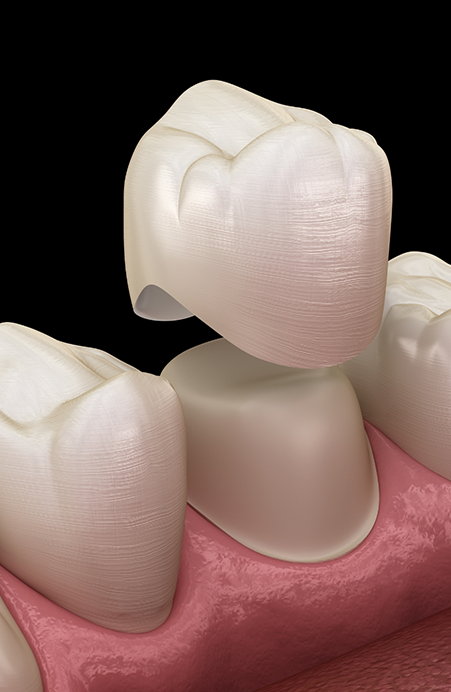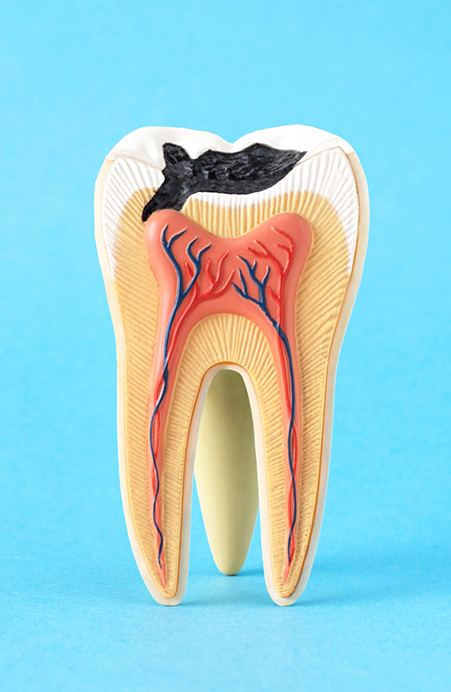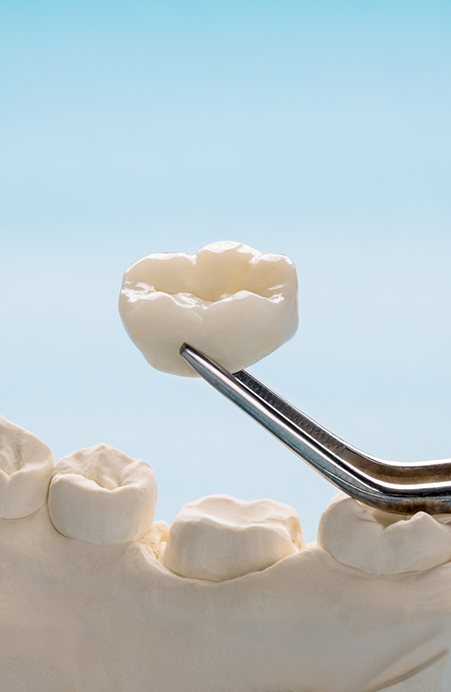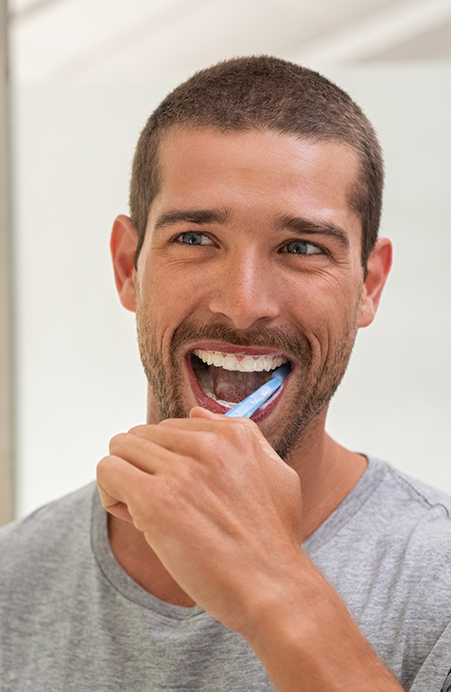Dental Crowns Greensboro
Broken Teeth? We Can Help

At the Greensboro dental office of David M. Fisher, Jr. DDS, we are dedicated to partnering with patients to keep their smiles healthy with regular, preventive dental care. However, even the most diligent patients can still experience tooth decay and damage. When you need to repair your smile, our team will create a personalized treatment plan that utilizes the most conservative restorations that restore function and retain the maximum amount of healthy tooth structure. Dental crowns are some of the most commonly used restoration options. If you need help to repair a damaged or decayed smile, call our team right away. It’s always best to get started repairing your smile as soon as possible to avoid further damage, so don’t hesitate to reach out to us as soon as you notice an area of concern.
Why Choose Dr. David M. Fisher, Jr. for Dental Crowns?
- We Treat Patients Like Family
- Advanced Technology for Designing Crowns
- Experienced Dentist and Team Members
What are Dental Crowns?

Dental crowns are restorations that fit over the top of your damaged teeth to recreate lost dental structures and protect your smile from further trauma. They can be crafted from a variety of high-quality materials, including metal alloys, gold, zirconia, porcelain fused to metal, and all-ceramic. Before we begin your restoration, we’ll discuss your options and help you select the best material to meet your needs. Because of their long-lasting natural appearance, we most often recommend all-ceramic crowns.
When Would I Need a Dental Crown?

Dental crowns are necessary in the following situations:
- To repair damaged, broken, or decayed teeth that cannot be fixed with a more conservative option like a filling
- To repair a tooth when a smaller filling restoration has been removed and cannot be replaced with a new filling
- To protect and strengthen root canal-treated teeth to avoid further injury or pain
- To support a fixed bridge tooth replacement prosthetic
- To replace missing teeth when attached to a dental implant post
- To enhance the smile’s appearance as part of a cosmetic dentistry plan
How are Dental Crowns Placed?

Dental crowns are placed over the course of two trips to our Greensboro dental office. At your first visit, we’ll numb the area around your damaged tooth. Then, we carefully remove any broken or decayed parts of the tooth. A small amount of healthy tooth structure will need to be removed around your tooth. This allows the dental crown to fit into the natural line of your smile without adversely impacting bite position and alignment.
Once your tooth is prepared, we capture impressions. These reflected images of your prepared teeth will be used by our skilled dental lab technicians to create a custom dental crown. To protect your smile in the meantime, we will place a temporary crown. This dental crown is made from softer materials, and it is not permanently affixed. You should be careful to avoid chewing with that part of your mouth until we receive the final restoration.
After your custom dental crown arrives in our office, you return for the second visit. This appointment is much shorter than your preparation. We simply remove the temporary and check the fit of your custom crown. If the custom restoration fits properly, we cement it into position, and you leave with a flawless smile. In rare instances, we may need to send the crown back for adjustments, but this only happens in a very small percentage of cases.
How Do I Care for My Dental Crown Restoration?

Once your dental crown is in place, you can brush and floss as usual. You may want to consider switching to a softer toothbrush or minimally abrasive toothpaste to avoid unnecessary dental wear, especially if you have a porcelain or ceramic restoration. Waxed floss or flossing tools that use air or water may also be beneficial to avoid pulling or tugging around the dental crown. During your six-month dental exams, we’ll carefully examine your smile for signs of wear and help you keep your crown whole and functional.
Dental Crown FAQs
How Long Will My Dental Crown Last?
Depending on the material the crown is made from, most crowns last somewhere between five and 15 years before natural wear and tear necessitates a replacement. Make sure to follow the dental crown care guidelines listed above to help your restoration last as long as possible! Dr. Fisher can also provide you with some personalized advice to ensure you make the most of your crown.
Does It Hurt to Get a Dental Crown?
Because we numb the affected area of your mouth beforehand, placing a dental crown should cause little to no discomfort. That said, you may experience a bit of soreness for a few days after receiving your crown, especially if we have to remove some enamel from the tooth. This should be temporary, but in the meantime, you can take an over-the-counter pain reliever like ibuprofen as needed.
What’s the Difference Between a Temporary Crown and a Permanent Crown?
A temporary crown acts as a placeholder while the dental lab technicians craft your permanent one. This process can take a few weeks, which is why a temporary is necessary to shield your tooth until then. Temporary crowns are often made from less durable materials, like stainless steel or acrylic. The material that bonds the temporary to your tooth is also weaker. For that reason, avoid eating particularly chewy or sticky foods until you receive your permanent crown, as they could dislodge the temporary.
How Much Do Dental Crowns Cost?
There actually is no fixed price you can expect to pay for a dental crown. Since each crown is custom-made to meet a patient’s specific needs, our team can’t give you a cost estimate without examining your specific situation first.
Keep in mind that even if you’re worried about the cost of a dental crown, they actually save you money down the road. Not getting a crown when you need one could cause the tooth to decay more quickly, resulting in the need for extraction and replacement – both of which are more expensive than a crown.
Will My Dental Insurance Cover a Dental Crown?
As long as you are receiving your crown to improve your oral health and not just for cosmetic reasons, your dental insurance will likely foot some of the bill. Every insurance plan is different, but most of them consider dental crowns to be a major restorative treatment and will cover between 50% and 80% of the cost.
Our experienced team can help you navigate your insurance plan and maximize your available benefits. If you’re uninsured, we can even provide low- or no-interest financing through CareCredit.

